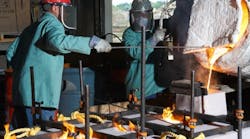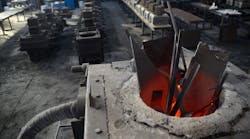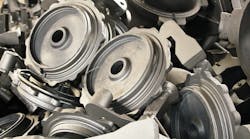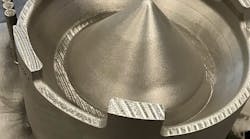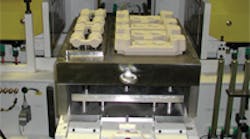Good quality cores are just as important as good castings, but for many metalcasters the challenge is greater because coremaking technology is a specialty that lies just beyond their expertise. There are so many variables relating to different types of molding systems in use, meaning some process factors must remain the same even when adopting a new coremaking process. Even so, improvements are expected — faster cycle times, higher throughput, product consistency, and more.
New core machines have a positive impact for foundries, as Progressive Foundry in Perry, IA, has been proving in recent weeks, but what are the standards for evaluating new systems?
Metalcasters identify several concerns and expectations about new coremaking machines: better quality cores; the ability to maintain their existing tooling systems, with minimal conversion; low conversion cost for switching from shell molding to a cold-box process; shorter set-up and cycle times; and low operating cost. Also, foundries want a simple transition to any new coremaking process, and they want to work with capable and experienced suppliers.
Progressive produces a variety of ductile and gray iron castings, in short runs. President Pete Van Kirk says the plant produces 60-80 tons of castings daily, with lots of product changeovers. As a result, Progressive has a high demand for cores of different designs, volumes, and styles. Most cores are produced by the shell process, he details, though Progressive also runs Isocure, cold box, and oilbased products.
In October 2008, Laempe + Reich installed a new LL20 core machine at Progressive, to produce more Isocure cores (from new business and by converting some of its shell process output), faster and with quicker changeovers. The LL20 is a standalone, fully integrated cold-box core production system, including the Laempe LL Core-Shooter, a gas generator, and a LVM Sand Mixer all controlled from a touch-screen HMI. Its control system stores over 1,000 coreboxes, as it oversees more than 100 cycles/hour. The machine’s shooting area is 1721 in., and standard machine cycle times are listed at 22 seconds.
So far, according to Van Kirk, the installation meets expectations. Process changeovers are taking 10-15 min., he estimates, and he’s “impressed that the machine runs 80-90% faster” than other Isocure core machines. “Core density is very consistent,” Van Kirk adds. He anticipates more improvement and cost savings as Progressive converts more of its shell-process cores to the cold-box process, reducing cycle times, and increasing core density and quality (which will reduce scrapped output.)
According to Jarek Olszak, Laempe + Reich’s sales engineer, a good core machine should have a “robust” design, with the flexibility to produce cores with most existing tooling packages. Specifically, he says a good cell must “address every aspect of core production, including sand mixing and gas generator.”
Olszak continues that the best core machine designs have mixing and gassing systems that are fully integrated with a process control package, for complete process control and accountability.
Progressive Foundry's new LL20 Core- Shooter is a compact system for job shops, with a vacuum attachment for quick tooling set-ups and changeovers. It is capable of operating with wood, urethane, aluminum, or iron tooling. The standard LL20 design is equipped to operate with vertical and/or horizontal tooling packages with up to six parts. Optional designs are available for larger horizontal tooling packages.
Progressive wanted a new machine that would reliably produce cores from existing tooling (with minimal modifications) in shorter cycle times. Availability of spare parts and equipment service were additional concerns. Olszak adds that Progressive wanted a supplier to offer “more of a total approach” — experience in coremaking technology, but also in process conversion and tooling applications. Laempe + Reich provided on-site technical service during equipment delivery, installation, start-up and preproduction testing. “This time is used for operator and maintenance hands-on training,” Olszak explains, “in addition to a ‘classroom’ training to cover the operators’ and maintenance manuals and troubleshooting procedures.”
Keeping the installation smooth and the transition trouble-free is as much a part of the success as the machine design. Laempe + Reich helped Progressive to revise its plant layout, to ensure the Core- Center fit well in the production process, and it provided detailed drawings for all machine structural supports and fabrications. It also managed the coordination of the new installation with the surrounding processes, e.g. raw sand delivery, binder and catalyst handling, and fume controls.
Progressive Foundry accelerated and simplified coremaking with a costeffective modernization that provided process flexibility and significant cost reductions, shorter cycle times, and better quality cores.





